International projects
Turiba University is actively expanding its international cooperation, initiating, developing, and implementing various local, national, and international projects.
We believe that the development of the University is inconceivable without innovative initiatives, the creation of new teaching approaches and methods, and without international collaboration. To prepare high-quality new professionals, it is essential for our university to provide opportunities for learning in an international environment, meeting lecturers, and professionals from around the world. Therefore, we realize international projects in collaboration with universities and partners worldwide.
Through these projects, we have developed new and innovative educational resources and tools, published books, organized international conferences, exchange trips, study visits, summer schools, and other activities.
We have extensive experience in international project management and have been actively involved in coordinating projects such as Central Baltic Interreg, Erasmus Mundus, Erasmus for Young Entrepreneurs program, European Social fund, JUSTICE, NORDPLUS, and ERASMUS+ projects.
Project department initiate and implement projects in collaboration with our faculties and their experts. We are excited to collaborate and bring your ideas to life! Get in touch with us:
KRISTĪNE NEIMANE, Head of project department: kristine.neimane@turiba.lv, Phone: +371 67615541, mob.+371 29628681
IEVA BRUKSLE, Project coordinator: ieva.bruskle@turiba.lv, Phone: +371 67616022
ERASMUS+ project “Digital Financial Literacy for Microenterprises” - DIFILIM
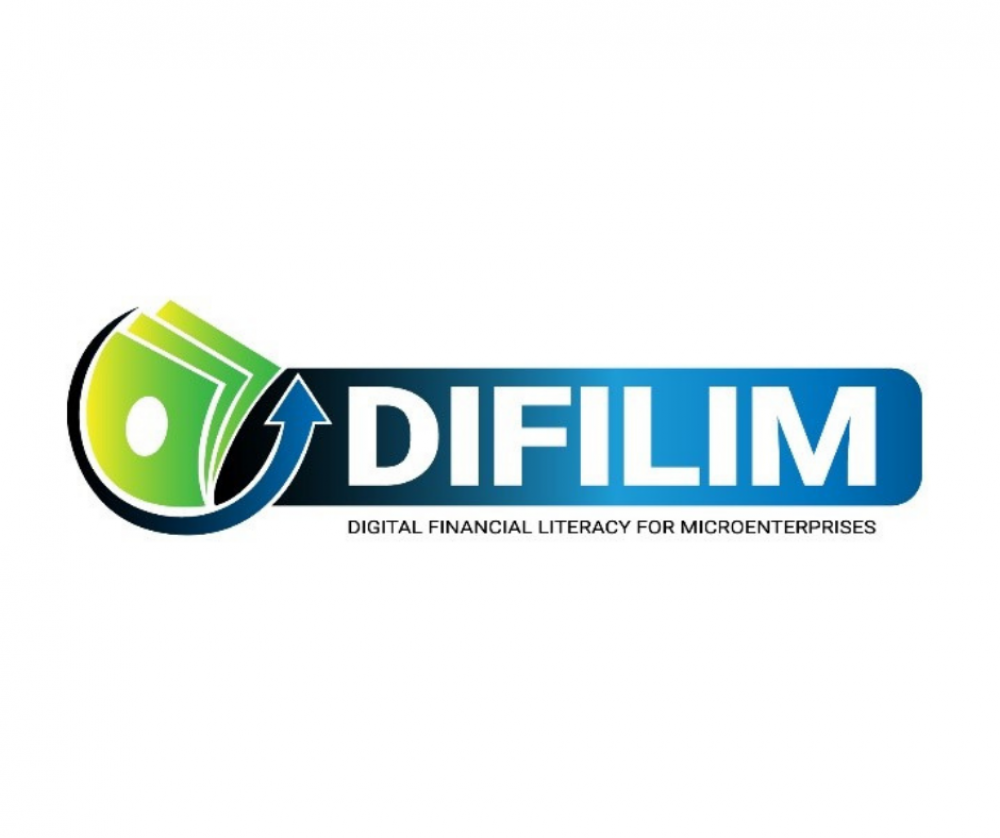
Turiba Univeristy in cooperation with partners from Cyprus, Italy, Portugal and the Netherlands started the porject DIFILIM - Digital Financial Literacy for Microenterprises. Main aim of the project is to contribute towards enhancing digital financial literacy/inclusion of European micro, small and medium-sized enterprises.
Most firms in European countries are SMEs, with rates exceeding 90%, whilst such countries also present very high solo self-employment shares in the EU. At the same time, the momentum for firms in these countries has not looked particularly favourable over the last decade. The rise of non-performing loans, the fragmentation in the EU financial system and the marginal availability of alternative sources of financing hinder productivity growth of firms across sectors and deter innovation and digitalization, which are perennial to the integration of enterprises to the 4th industrial revolution. Against the above background, the era of financial technology (FinTech) is changing the financial services industry at a rapid pace, with consumers and “small investors” becoming increasingly more exposed to new financial products. Managing personal finances today is more complicated and time-consuming, yet more important than ever. People need to have an ever-increasing financial awareness to effectively use products offered through digital channels. The digital age demands “digitally smart” people for their effective participation in the new economy.
The project has set the following goals:
- To contribute towards enhancing digital financial literacy/inclusion in certain European micro, small and medium-sized enterprises (MSMEs).
- To identify digital and financial literacy needs and provide training to fill in this gap for both professional and unemployed people.
- To develop an attractive, training programme in the country language, that will allow digital financial literacy enhancement.
- To deliver a curriculum to meet the real needs of entrepreneurs in the areas of financial literacy and digital skills.
- To design and apply a curriculum to deliver skills in a combination of methods including an e-learning platform.
- To create networks at local, regional and European levels for spreading good practices of educational integration.
Planned project activities:
- Research on the needs and impact of Digital Financial Literacy on enterprises in each Partner Country;
- Guidebook of Digital Financial Literacy for Microenterprises in each Partner Language;
- Online Training Platform development in English and each Partner Language;
- Monitoring, Quality Assurance Plan and Dissemination Strategy.
Lead partner:
- Latvian Chamber of Commerce and Industry (Latvia)
Partners:
- Turiba University (Latvia)
- Cyprus University of Technology (Cyprus)
- Magnetar Ltd (Cyprus)
- Forma Camera, Special Agency of the Chamber of Commerce, Industry, Craft and Agriculture of Rome (Italy)
- Amadora Inovation E.M. Unipessoal Lda (Portugal)
- Stichting Incubator (The Netherlands)
1. PROJECT RESULT
The Project Result 1 considered research on the needs and impact of Digital Financial Literacy on enterprises in each Partner Country. The 'Digital Financial Literacy for Microenterprises' survey, which was distributed online by all partners, received a total of 134 responses which were analyzed and compiled into a report.
The main findings of the report can be summarized as follows: (i) The financial literacy of micro entrepreneurs is relatively low in most participating countries. On average across DIFILIM participating countries, only 11% of microenterprises' owners with up to 9 people and 19% of microenterprises' owners with 10-49 people showed high levels of financial literacy. (ii) Although the digitalization of many microenterprises is high, most microenterprises' owners report a lack of skills to support the digital transformation process. On average across DIFILIM countries, fewer than 40% of microenterprises with up to 9 people indicated that they have the necessary workforce and skillset. Relatively few businesses have a clear road map for implementing Industry 4.0 or know exactly what to do when it comes to digital transformation. (iii) At the same time, 43.28% of respondents answered that their business has received some form of support introduced due to the pandemic.
2. PROJECT RESULT
The 2nd project result consisted of two main deliverables:
• The DIFILIM European Report.
• Five partner countries' Guidebooks.
The DIFILIM European Report aims to describe and state the current situation of digital and financial literacy support, as well as policies in 5 partner countries – Latvia, Cyprus, Italy, Portugal and the Netherlands. Furthermore, the DIFILIM project sets out to identify the existing gaps in the financial and digital skills of entrepreneurs by surveying SMEs in all five partner countries. Based on the identified gaps, the training course and materials will be developed.
The report consists of 5 partner country analysis, arranged to give an overall introduction of the business environment and SME's role in it, then moving on to the specific initiatives and support in the five partners' countries, as well as describing the policies brought out in each country. At the end of the report, the structured analysis of all the support and policies available across the five DIFILIM consortium countries is carried out. This gives an overview of the current actions, as well as shows the challenges and gaps for financial and digital literacy.
The National Guidebooks help entrepreneurs and individuals in each partner country separately, to learn about the status and policies of Digital and Financial Literacy, existing opportunities for training and additionally comparison with the learning opportunities of the DIFILIM Project's Training Resources.
The main chapters of each national guidebook are listed below:
• Overview
• Financial Literacy status
• Digital Literacy status
• Existing Support for Financial Literacy
• Existing Support for Digital Literacy
• Cops
• Overview Table and Comparison With DIFILIM Provisions
• Financial Literacy Roadmap
3. PROJECT RESULT
The main output of project result 3 is the multilingual project's website (difilim.eu). The website, in addition to general project information, contains the training resources of Digital and Financial Literacy connected to the DIFILIM theme. The total number of visits on the website upon project completion was over 3500 and the total number of registrations on the online training platform was 255.
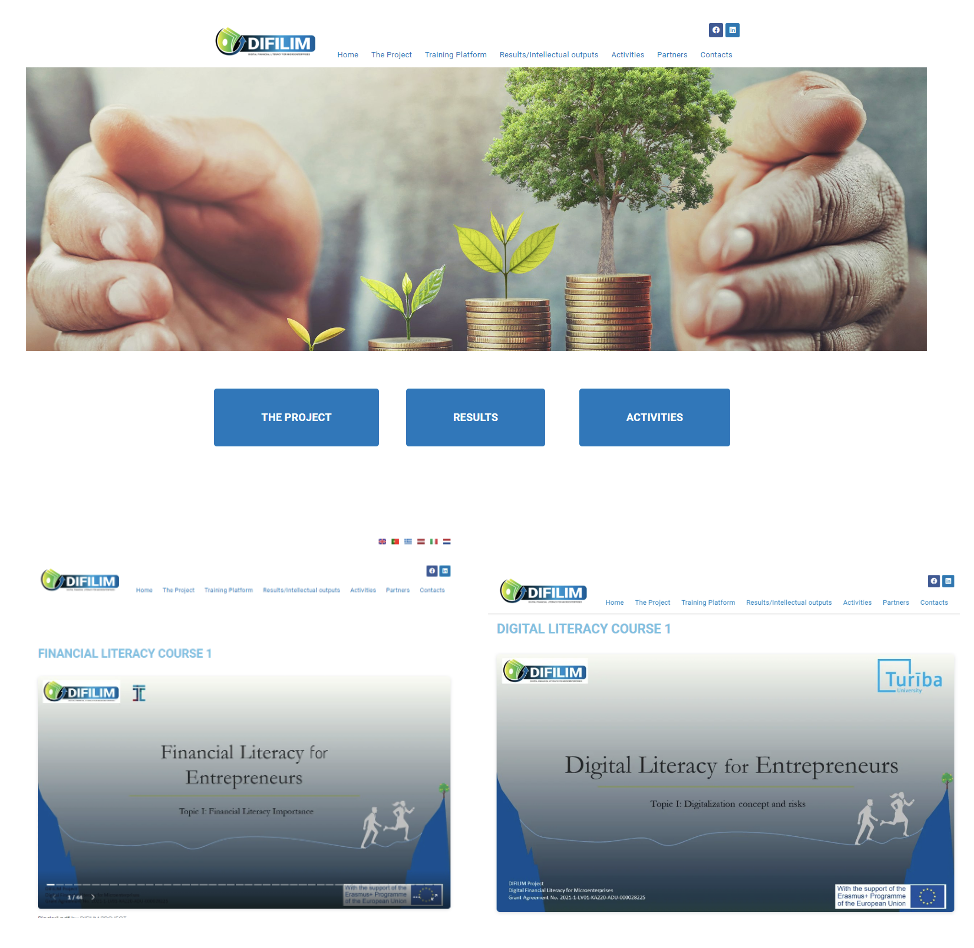
4. PROJECT RESULT
Project Result 4 started with a deliverable of a three-part Methodology concerning the overall management of tasks and monitoring of the Erasmus+ Project DIFILIM (Digital Financial Literacy for Microenterprises. It describes the following:
• The Implementation Plan of the project including division of tasks and timeline for each partner.
• The Monitoring and Quality Assurance Plan of the project including Annexes with questionnaires and monitoring tools.
• The General Dissemination Strategy of the activities and results of the project with useful templates.
Some dissemination campaigns that took place in social media are shown below:
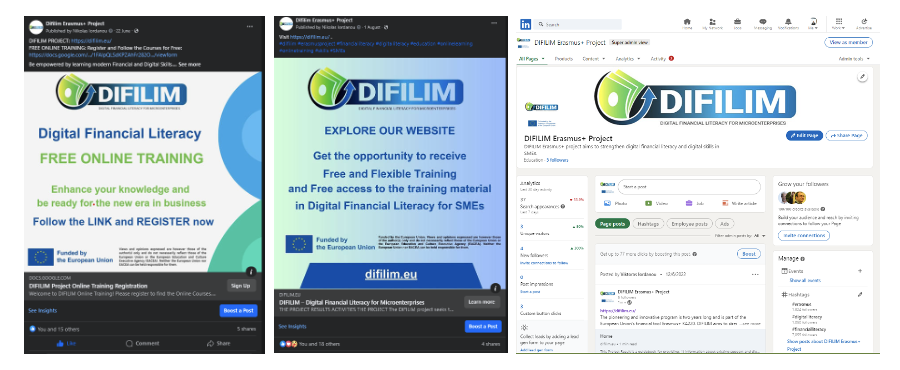
Multiplier Events and Training Activities
The DIFILIM Project partners organized 6 multiplier events in the 5 Partner Countries with almost 200 participants in total which included a training session after the presentation of the project and its results in each country.
The national events hosted a series of speakers/panelists who presented and discussed the findings and elaborated on the training and learning agenda to elevate the levels of digital financial literacy among micro-entrepreneurs.
The target audience included students and young people, youth entrepreneurs, start uppers, micro-entrepreneurs, SME owners and the public. The objective was to exploit the survey results to develop guidance aiming to inform the
training and learning agenda to support MSMEs and entrepreneurship, improve programme design and set forth some measurement and evaluation tools. The Dissemination Events - Workshop took place at the final months of the completion of the project.
All project activities were presented to the target audience and the stakeholders. Also, the training activities (face to face) took place on close dates or as a continuation of the Dissemination Event depending on the organizing Partner.
Target groups and participants included the General public, Established entrepreneurs, Future entrepreneurs, Enterprises and Industry personnel, University Students
Stakeholders included Chambers of Commerce and Industry, Business Organizations and Associations, VETs, Universities, Accelerators, Incubators.
Stakeholders who play the role of intermediary bodies between individuals and final successful business development, benefit from the set of tools and material that were created through the project.
A very important part of the Dissemination event was the presentation of the e-Learning platform and the implementation of the training workshop that described all parts of the online tools, and the target audience was trained on the use of it.
Online training in all partner countries took place on the last quarter of the project, giving the opportunity to as many participants to use the tools-service and follow the courses to also provide feedback for improvement. More than 250 participants registered for the online courses.
Dissemination Event and training in Latvia:
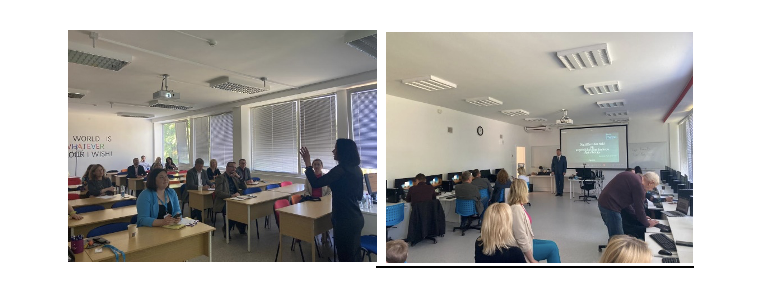
Dissemination Event in the Netherlands:
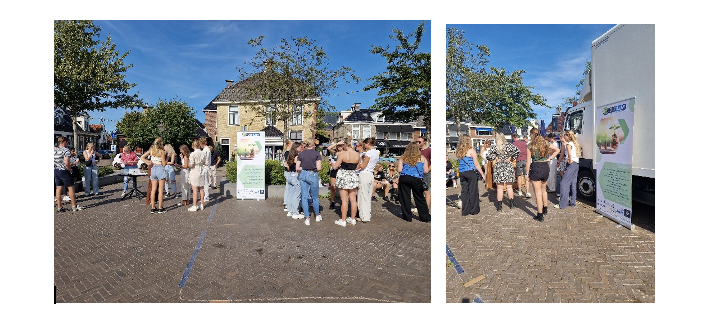
Dissemination Event and training in Cyprus:
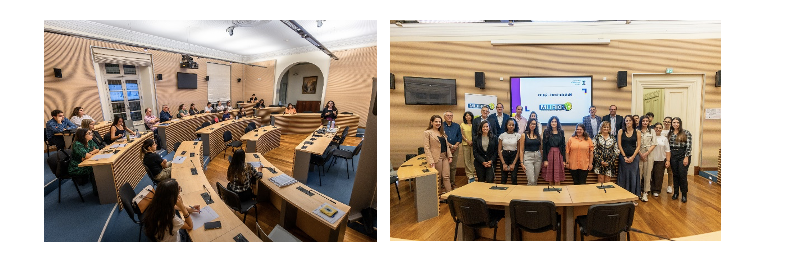
Follow DIFILIM in social media - on Facebook and LinkedIn.
Project is co-financed by ERASMUS+ programme.
Project number: 2021-1-LV01-KA220-ADU-000028225
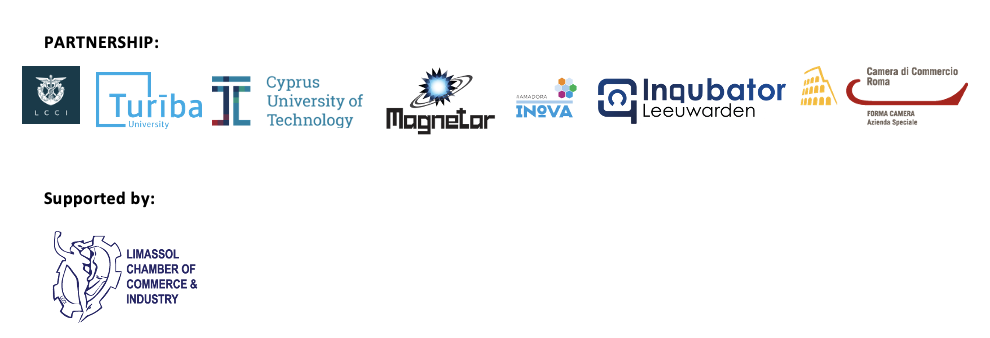
DIFILIM – Digital Financial Literacy for Microenterprises
PROJECT NEWS
Project implementation period: 01.11.2021 - 31.10.2023
Contacts:
Ieva Bruksle
Project expert
Vice-dean of the Business administration faculty
ieva.bruksle@turiba.lv
Kristīne Tihanova
Project manager
Head of project department
kristine.tihanova@turiba.lv
+371 67625371
Project is co-financed by ERASMUS+ programme.
Project number: 2021-1-LV01-KA220-ADU-000028225

